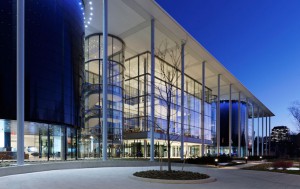 Business schools around the globe are attempting to improve their campuses – and compete for the best students – with major renovations and new construction.
Business schools around the globe are attempting to improve their campuses – and compete for the best students – with major renovations and new construction.
Despite the risk to schools – the number of applications for MBA programs is slightly down in recent years –there is a need to keep pace with competitors in what they offer students.
In an article on the topic, The Economist noted that many campuses were built or last updated in the 1960s and 1970s and need a facelift. However, the magazine noted, “Rising expectations among prospective students also play a part. The posher the school, the more demanding its applicants.”
Among the list of recent changes on some major business school campuses:
- In January, Yale’s School of Management opened its new home, Edward P. Evans Hall, named after the Yale graduate and Virginia horse breeder who donated the school $50 million in December 2010, a month before his death. The new building enables Yale to admit 320 students per year, rather than the current 290.
- Phil Knight, a Stanford graduate and founder and chairman of Nike, gifted $105 million to the Stanford Business School in 2006. The money was used to help fund construction of the Knight Management School, which opened in 2011, and is billed as an environmentally sustainable building.
- The Kellogg School of Management at Northwestern University in Chicago, Ill., is about to start construction on a $200 million new building on the shores of Lake Michigan. According to the school website, the education center will be a 40,000-square-foot building and will “capture the spirit and energy of Kellogg and our unique approach to community building.”
- The Columbia School of Business is almost finished raising the $600 million it needs to complete two new buildings in the Manhattanville area of New York City, according to The Economist. Henry Kravis, co-founder of private equity firm Kohlberg Kravis Roberts & Co., has pledged $100 million to the new campus. Billionaire investor Ronald Perlman has also pledged $100 million, meaning one building will be named after him and the other after Kravis.
While there is gamble for business schools spending so much, most of the money is coming from wealthy alumni or foundations. Kellogg, for example, has said they will not spend any tuition money on the new building. The Economist points out that most schools have full-time employees who concentrate on fundraising.
Another danger is that online learning will make having spectacular campuses unnecessary. Sally Blount, the dean of Kellogg, put it succinctly to The Economist: “Our industry is about to transform itself. You have to decide whether you are in or out of face-to-face education.”
In the case of the major business schools, they are definitely “in” and attempting to offer potential students the best campuses they can afford to construct. The thought, according to Blount in The Economist, is that the lure of networking with other students and getting a brand-name degree will not diminish, even in an era of increased participation in online courses.





